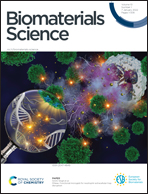In situ mucoadhesive hydrogel capturing tripeptide KPV: the anti-inflammatory, antibacterial and repairing effect on chemotherapy-induced oral mucositis
Abstract
The self-healing of chemotherapy-induced oral mucositis is difficult in practice because of both local bacterial infection and severe inflammation. Herein, in situ mucoadhesive hydrogels (PPP_E) were successfully prepared by using temperature-sensitive PLGA-PEG-PLGA (PPP) as a matrix and epigallocatechin-3-gallate (EGCG) with inherent antibacterial activity as an adhesion enhancer. A series of PPP_E precursor solutions with various EGCG concentrations (1%, 2% and 5%) were prepared by fixing the PPP concentration at 25%. EGCG slightly decreased the sol–gel transition temperature and shortened the sol–gel transition time of the PPP hydrogel. Moreover, the incorporation of EGCG could significantly increase the tissue adhesion properties of the PPP hydrogel at 37 °C. PPP_2%E displayed a suitable gelation temperature (36.2 °C), gelation time (100 s) and storage modulus (48 Pa). Tripeptide KPV as a model drug was easily dissolved in cold PPP_2%E precursor solution to prepare KPV@PPP_2%E hydrogel. The anti-inflammatory activity and promotion of cell migration potential by KPV in PPP-2% E hydrogel were well maintained. Moreover, KPV@PPP_2%E exhibited strong antibacterial efficacy against S. aureus. PPP_2%E precursor solution rapidly transformed to a hydrogel and adhered to the wound surface for 7 hours when administrated to the gingival mucosa of rats. Treatment with KPV@PPP_2%E hydrogel greatly improved the food intake and body weight recovery of rats with chemotherapy-induced oral mucositis. Moreover, the tissue morphology of the ulcerated gingiva after application of KPV@PPP_E hydrogel was also well repaired by promoting CK10 and PCNA expression. In addition, the inflammatory cytokines including IL-1β and TNF-α were significantly inhibited by KPV@PPP_2%E hydrogel while IL-10 was up-regulated. KPV@PPP_2%E hydrogel also had an anti-bacterial effect on MRSA-infected gingival ulcer wounds, which resulted in the obvious inhibition of infiltration by inflammatory cells into submucosal tissues. Conclusively, KPV@PPP_E may be a promising practical application for cancer patients with chemotherapy-induced oral mucositis.



 Please wait while we load your content...
Please wait while we load your content...